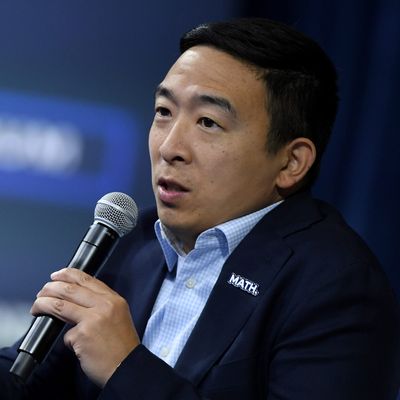
Andrew Yang is not going to be president. The entrepreneur posts a steady 4 percent in polls of primary voters, which is enough to get him and his math pin on the debate stage, but is not enough to win him the Democratic nomination, let alone the White House. Nevertheless, he persists, and continues to roll out policy proposals. Each in their turn provides fresh affirmation that he is not suitable for high office.
Consider his new health-care plan. Announced on Monday, it backs away from Medicare for All, a policy Yang previously said he supported. But Yang is not content to merely pull a Buttigieg. He’s tried to introduce his own fresh ideas, and while several are decent, the overall proposal is light on detail and high on technobabble. Yang says he wants to reduce the cost of prescriptions — great, necessary — and would “create public manufacturing facilities” to manufacture generic, or unprofitable, drugs. Also a good idea! A few other Yang proposals also satisfy long-standing demands of the reproductive-rights movement: He says he’d ensure that birth control is available over the counter, and supports the repeal of the Hyde Amendment.
But in other areas, Yang goes off the rails. “Can innovation help reduce health care costs?” he asks, and then answers his own question with a few bullet points about telehealth. He will “encourage the use of telehealth in rural areas and for mental health services.” How? Ask God. Only He knows, because Yang does not explain himself. Yang’s additional ideas are similarly vague. He’ll invest in broadband, he says. Which is sort of implied by his initial emphasis on telehealth, because you cannot expand its use in rural areas without better broadband access.
Yang dedicates another plank in his plywood platform to expanding access to assistive technology. “Existing technologies like telehealth and emerging technology like medical AI must be leveraged to expand care,” the plan says. It’s not a false statement. It’s just meaningless. Yang says only that he will “invest in the development and deployment of medical technology in rural areas,” which tells us almost nothing about his plans. Does he have a specific technology in mind? How will he get it done? These mysteries remain unexplored.
Meanwhile he has little to say about about health insurance. He says that it is “urgent to integrate mental health care into health insurance plans,” and that he’ll make insurance companies cover the cost of public transport to health care for people with disabilities. Both are fine ideas, but they’re patchwork solutions to much broader problems. He’ll “fully cover all maternal costs,” but doesn’t say how. Will he force health-insurance companies to do it? How exactly will he “ensure comprehensive care includes vision and dental services?” But hey, if he becomes president at least there will be robots for all. Maybe holograms! The good people of the rural Midwest might never see a flesh and blood physician again, but really, is it even necessary? Dire circumstances call for innovative solutions.
Yang’s health-care policies suffer from the same flaw that undermines the rest of his campaign. Touting his entrepreneurial background, he tries to stake out a position somewhere between the right and the left. But rather than aim for the centrist lane, as Buttigieg and Biden have done, he ends up wandering the wilderness without a map. His signature policy, a universal basic income or “freedom dividend,” reflects neither the ideology of the right or of the left, though it’s probably closest to the former. The basic notion of a UBI has some support both among libertarians and leftists, though they envisage its relationship to the welfare state in drastically different ways. To its leftist backers, a UBI should be an additional welfare benefit, not a replacement for benefits that already exist. Libertarians, however, perceive it as a way to cut down the size of the welfare state. Give a household a certain sum of money every month, and they won’t need housing vouchers. President Yang’s freedom dividend would give each American adult $1,000 a month — as long as they gave up some, but not all, welfare benefits. You could keep your food stamps, but what would happen to your other benefits? The answer isn’t entirely clear, and that’s largely Yang’s fault. He’s never fully explained which benefits a dividend recipient could keep, and which she would have to give up.
Applied to health care, Yang’s vague and technocratic approach would be disastrous. The rising cost of private insurance creates an urgent need for tangible solutions. Other candidates have them: Compare Yang’s proposal to those released by Senators Bernie Sanders and Elizabeth Warren, and the differences are stark. Yang wants desperately to be taken seriously as a candidate, complaining frequently that the media has ignored his campaign. But at some point, he has to earn the respect he craves, and that’s difficult to manage without a clear ideology or at least a solid, evidence-backed policy idea. To date, he has neither. Fortunately for all of us, he is not going to be president. At least, not this time.






























